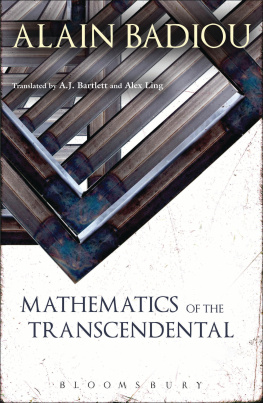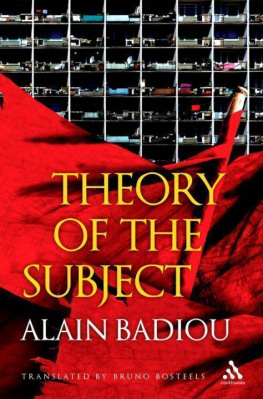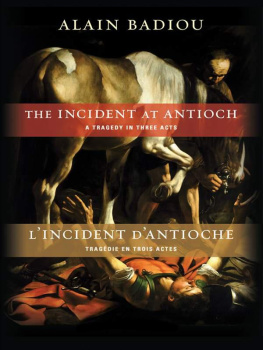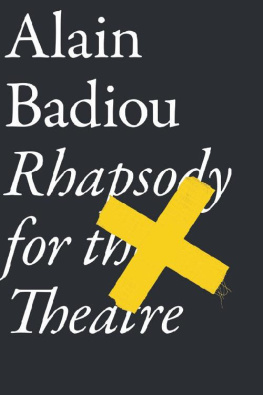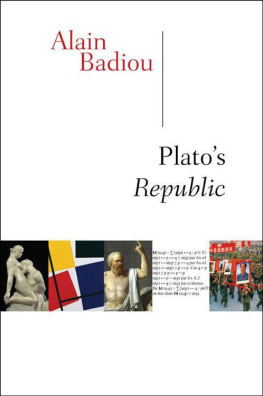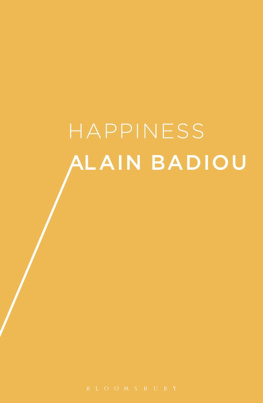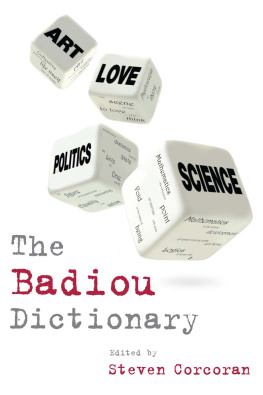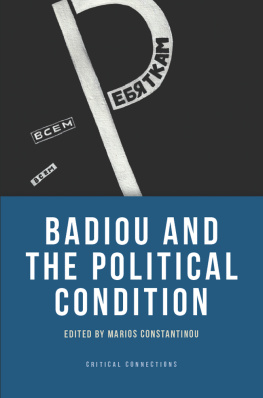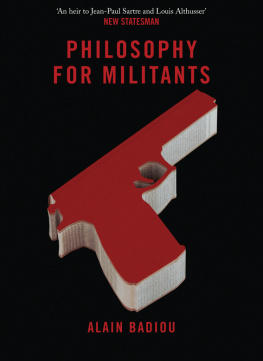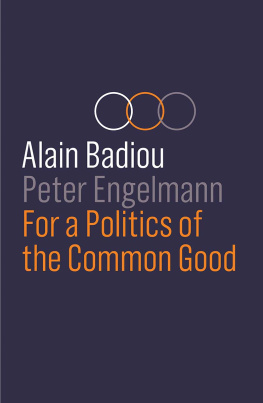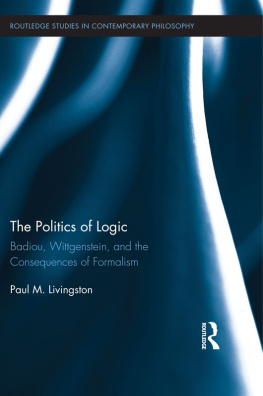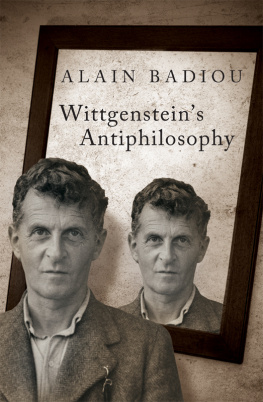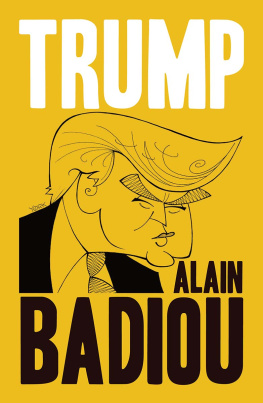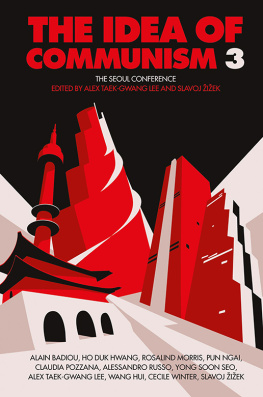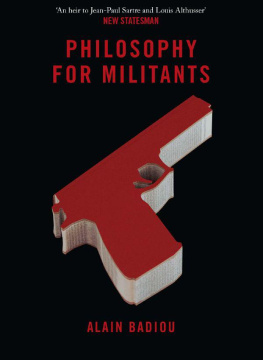Contents
Guide
Pages

Philosophy and the Idea of Communism
Alain Badiou in conversation with Peter Engelmann
Translated by Susan Spitzer
polity
First published in German as Philosophie und die Idee des Kommunismus Passagen Verlag GmbH, 2013
This English edition Polity Press, 2015
Polity Press
65 Bridge Street
Cambridge CB2 1UR, UK
Polity Press
350 Main Street
Malden, MA 02148, USA
All rights reserved. Except for the quotation of short passages for the purpose of criticism and review, no part of this publication may be reproduced, stored in a retrieval system, or transmitted, in any form or by any means, electronic, mechanical, photocopying, recording or otherwise, without the prior permission of the publisher.
ISBN-13: 978-0-7456-8839-8
A catalogue record for this book is available from the British Library.
Library of Congress Cataloging-in-Publication Data
Badiou, Alain.
[Philosophie und die Idee des Kommunismus. English]
Philosophy and the idea of communism : Alain Badiou in conversation with Peter
Engelmann / Alain Badiou, Peter Engelmann. -- English edition.
pages cm
Includes bibliographical references.
ISBN 978-0-7456-8835-0 (hardback) -- ISBN 978-0-7456-8836-7 (pbk.)
1. Philosophers--France--Interviews. 2. Communism. 3. Political science--Philosophy.
I. Engelmann, Peter, interviewer. II. Title.
B2430.B274A5 2015
355.411--dc23
2014043391
The publisher has used its best endeavours to ensure that the URLs for external websites referred to in this book are correct and active at the time of going to press. However, the publisher has no responsibility for the websites and can make no guarantee that a site will remain live or that the content is or will remain appropriate.
Every effort has been made to trace all copyright holders, but if any have been inadvertently overlooked the publisher will be pleased to include any necessary credits in any subsequent reprint or edition.
For further information on Polity, visit our website: politybooks.com
23 March 2012
Peter Engelmann Before we turn to the specific topic of our discussion, the Idea of communism in your philosophical work, Id like to contextualize these questions in terms of both philosophy and politics. In your philosophy you develop a concept of the subject different from that of capitalist society, which views the subject reductively as a consumer and an economic competitor. The concept of the subject has a long history in philosophy, and in France there has been, as well, a theory of the death of the subject. What Im interested in is how your concept of the subject has been inscribed in the French philosophical context since the 1960s to 1970s.
Alain Badiou Id like to make two comments about this. First of all, my first great philosophical influence was Sartre, in the 1950s. During all my early years of studying philosophy I considered the category of the subject to be fundamental, and it was, in particular in the form of the free consciousness, as Sartre was developing it at the time. I can therefore say that, philosophically, I come from, or come out of, a philosophy dominated by the theory of the subject, with a phenomenological vocabulary. So it was the subject in Sartres sense, but also in Merleau-Pontys sense, or even in Husserls sense. Starting in the late 1950s, when I arrived at the cole Normale, met Althusser, read Derridas first books, and encountered Lacans teaching, I became involved in what was called structuralism at the time, that is, a philosophy in which the subject is problematic. In Althussers view, the subject was an ideological concept, a bourgeois concept. In the view of Lvi-Strauss and the structuralist tradition, it was structures that mattered, and, in the Heideggerian tradition, the subject was a concept from metaphysics that needed to be deconstructed. So I came into contact with all these things at that time, but with a sort of instinctive resistance that had a philosophical origin the teaching of Sartre and of the great phenomenology of the period as well as more personal or practical roots, which were that I couldnt see how you could do without the category of the subject in politics.
PE Why wasnt it possible to give up the subject in politics?
AB In politics in particular, because it was very clear to me that politics was a matter of orientation, action, decisions, and principles, a matter that demanded a subject or a subjective dimension. I observed, moreover, that the attempt to reduce politics and Marxism to a purely objective, purely structural, context, without the figure of a subject, led to nothing but a sort of pure economism, in which it wasnt even clear what political action properly speaking, as decisive, voluntary, and constructive action, was. For all these reasons, I got involved in structuralism nonetheless, along with my friends at the time, but with the idea that it ought to be possible to reconcile the teachings of structuralism and/or deconstruction with a renewal of the concept of the subject, by transforming and retaining the category of the subject. Ultimately, I think the most important teaching for me back then was Lacans, because Lacan was someone who, on the one hand, attached great importance to structures and particularly to the structures of language the unconscious is structured like a language, etc. but who, on the other hand, as heir to the psychoanalytic tradition, naturally retained the category of the subject. He not only retained it but even transformed it, making it into something absolutely central. So I regarded this teaching as a chance to find a way in which some of the lessons of speculative modernity could be accepted while at the same time the category of the subject could still be retained, in exchange, of course, for an important transformation of that theory. I think this has remained my project to this day.
PE I have long wondered how you define your position in this connection. You said that it was impossible to act without the concept of the subject, particularly with regard to politics. But Id like to go back to philosophy. You alluded to some philosophers who developed a critique of the concept of the subject, but then you switched abruptly to politics.
AB No, I simply gave politics as one example of a field of creativity and activity in which the whole problem is precisely the construction of a subject.
PE Would you agree if I said that a concept of the subject is needed in every field of human endeavor?
AB Wed have to make a detour, in that case, because the concept of the subject in my work is closely linked to two other concepts that of event and that of truth. A subject is always a subject of truth. It is always the subject for or in a process of constructing a truth. My way of critiquing the metaphysical concept of the subject is to say that the subject is a creation or a construction, and that its not a given. What is given is in the form of the individual, for example. But individual and subject are not one and the same for me. Ultimately, theyre even in a completely fundamental opposition to each other, even though individuals are always called to become subjects or to be incorporated into a subject. Its a summons, not a constant, natural movement. And this summons occurs via a real process, which might be political but might also be something else. It might be a political process, or an artistic process, or an amorous process. In all these cases there is a subjective summons.


